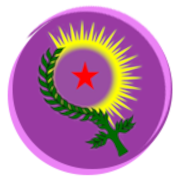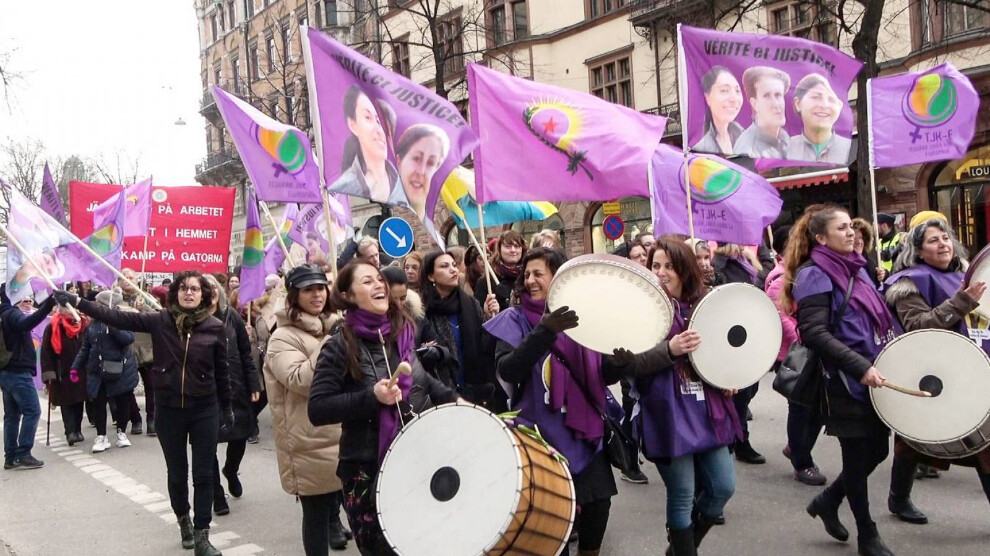Kurdish Women’s Confederal Organization in Europe
Kurdish migration to Europe has been driven by economic but mainly political pressures. Especially in 1990, the Kurdish people faced a mass massacre and exile from their own lands. During this period, 30 thousand Kurds were killed by the fascist Turkish state, and more than five thousand villages were evacuated. As a result of the oppression and torture, there was an intense flow of migration, both to the metropolises of Turkey and to Europe.
It has always been difficult for the Kurds, who continue their lives as a stateless community, to maintain their lives in the four parts of Kurdistan. The genocidal practices of the dominant nation-states against the Kurds have been similar in Turkey, Iran, Iraq, and Syria. There have always been exile and migration in the four parts of Kurdistan throughout history.
For a people whose existence, identity, and freedom have been taken away from them, political awareness and, especially, getting organized is required to sustain themselves and preserving their language, identity, and culture. Otherwise, there is a serious danger that, while fleeing assimilation and genocide policies, they will be ground to powder in the wheels of liberalism and capitalism on a continent like Europe.
The national, class, and cultural consciousness that developed in Kurdistan under the leadership of the ‘Partiya Karkerên Kurdistan’ (Kurdistan Worker’s Party, PKK) paved the way for the people and women to organize themselves. The first women’s organization that prioritized patriotic consciousness was the ‘Yekitiya Jinên Welatparêz ên Kurdistan’ (Patriotic Women’s Union of Kurdistan, YJWK) in Germany in 1987. Kurdish women came together, organized themselves, and took the first step. The patriotic feeling is essential to knowing who you are, keeping alive your spirit and emotions attached to where you belong, and determining where you will be oriented. For this reason, the women’s organization that developed in Europe has a historical and social significance.
The primary aim of the YJWK has been to reach and organize Kurdish women who were spread all over Europe through the diaspora. The women who were thus reached created political awareness, organized themselves, and took an active part in the struggle for freedom, in social as well as political activities. These efforts have created an important accumulation and legacy for today.
The Kurdish women’s movement in Europe has expanded its organization and enriched its work based on this heritage. Against the capitalist, liberal policies of the European system, it has developed its organization based on its own strength, and has primarily focused on educational activities, cultural, artistic, and information work, organization, and actions in order to prevent women and the people from melting into the capitalist system. On the other hand, by developing sensitivity to the genocidal and exterminational attacks in Kurdistan, which has its own identity, culture, language, and political organization, it has enabled women to see themselves as a part of the struggle and to support it, making them the vanguard of the struggle.
Based on the need to preserve moral and ethical values against the destructive lifestyle of the European system and the need to have a clear goal and belief, it was considered necessary to fill the ideological, philosophical and paradigmatic gaps and organize on this basis. They argued that the only way to protect the community from the temptations of liberal life was to ensure sociality, to spread the organization to large segments in order to prevent this sociality from disintegrating, and to make the developing organization permanent through institutionalization.
In order to meet these needs, to solve problems and to create alternative spaces of struggle and life, women have organized themselves in the form of a confederal system. On this basis, committees, assemblies, unions and a movement were formed.
The development of a women’s confederal system, which takes its perspective and philosophy from the paradigm of the leader of the Kurdish people, Abdullah Öcalan, based on basic democracy, social ecology and women’s liberation, has been organized in many countries of the European continent.
In order to ensure the direct participation of the Kurdish women, who are spread in every corner of the continent, in the existing organization, it was organized from the local level and committees and assemblies were formed in neighborhoods, districts and provinces. In the assemblies, commissions were formed according to the needs. The struggle against forced and voluntary assimilation, sexist liberal backward and traditional policies and practices was carried out on the existing organizational basis and alternative plans, projects and programmes were created. Women’s solidarity has been strengthened by trying to make visible and raise awareness about the oppression, violence, repression and discrimination that women face in the family, in the streets, at work, at school and in the economic spheres, and the inequality and exploitation imposed on them. On the other hand, through periodic campaigns, the construction of honor and the massacres imposed on women have been exposed and positive campaigns have been carried out for women to become subjects in the social reconstruction.
Original and autonomous structures have been established to overcome social sexism, to create a democratic life, to create free women and free men and to create institutions that will ensure the permanence of this consciousness.
Since 2014, committees have been formed in many areas such as social, social, economic, diplomatic, cultural, faith, educational, language, young women, [the science of women created by the Kurdish movement] Jineolojî etc., within the scope of the women’s confederal system, which has been organized in a unique and autonomous manner. With the self-organization of these committees within the local assemblies, local will, consciousness, empowerment, solidarity and collective spirit have been developed and strengthened.
The committees formed in the assemblies are of great importance in order not to leave any detail of life at the mercy of the sovereign powers. Economic problems, social, mental, spiritual, emotional, cultural, artistic, literary problems created by the patriarchal system as a whole are all addressed by these committees and worked on for solutions.
The Kurdish Women’s Movement in Europe has made significant progress in raising awareness and organizing through actions, educations, press and media work, economic models, workshops, cooperatives, women’s solidarity networks, organizing international conferences, social forums and camps, short and medium-term moves to raise awareness against violence against women and massacres of women, family visits and family training camps, unique men’s trainings and education, etc.
In Europe, there is a serious ground and potential for the development of the democratic confederal system of the Kurdish Women’s Movement. On the one hand, the Kurdish people coming from four parts of Kurdistan, on the other hand, the coexistence of different beliefs (Alevi, Ezidi [Yazidi], Yarsan, Muslim, etc.) carried by the people, together form a fertile ground for the formation of a political consciousness in the concept of ‘democratic nation’ under the leadership of women by overcoming the colonialist influences and perspectives experienced in Kurdistan. Again, democratic power unions and international solidarity networks, initiatives and organizations have created a great potential for the development of local and global alliances. Through this potential, work is being done and organizational models are being developed for the Women’s World March, the Women’s World Congress and the work of the Women’s Democratic Front. The strong meeting and unification of women’s will on how to live and how to organize their lives through the Social Women’s Contract continues to be an important agenda.

